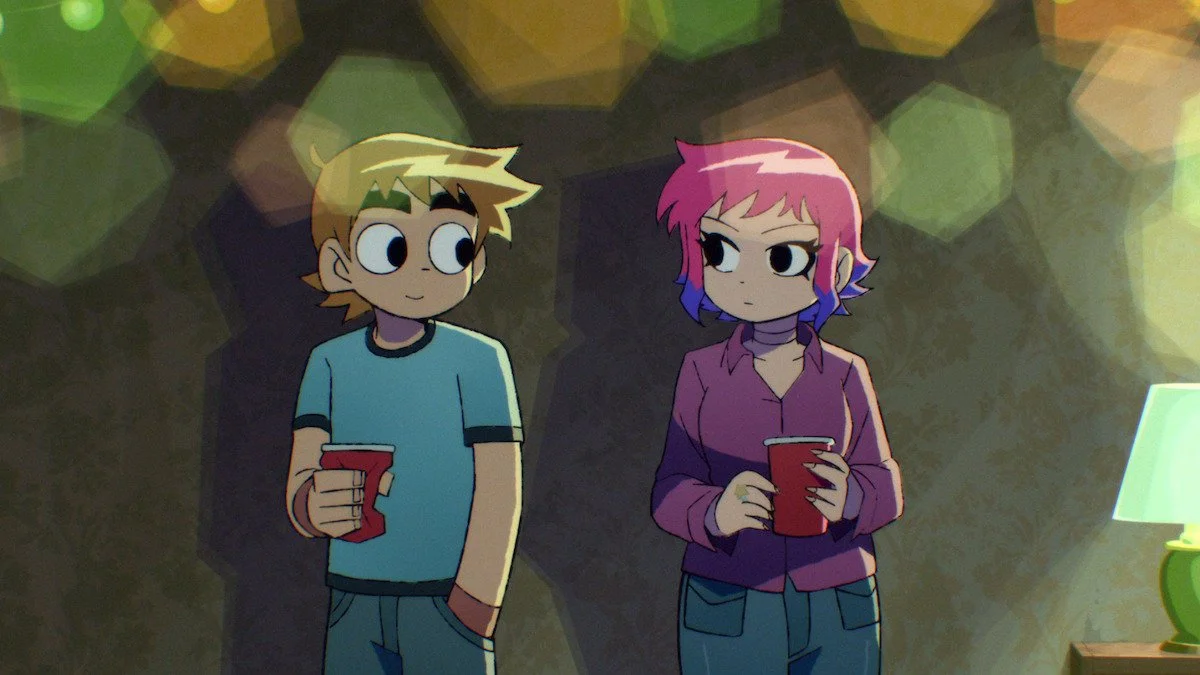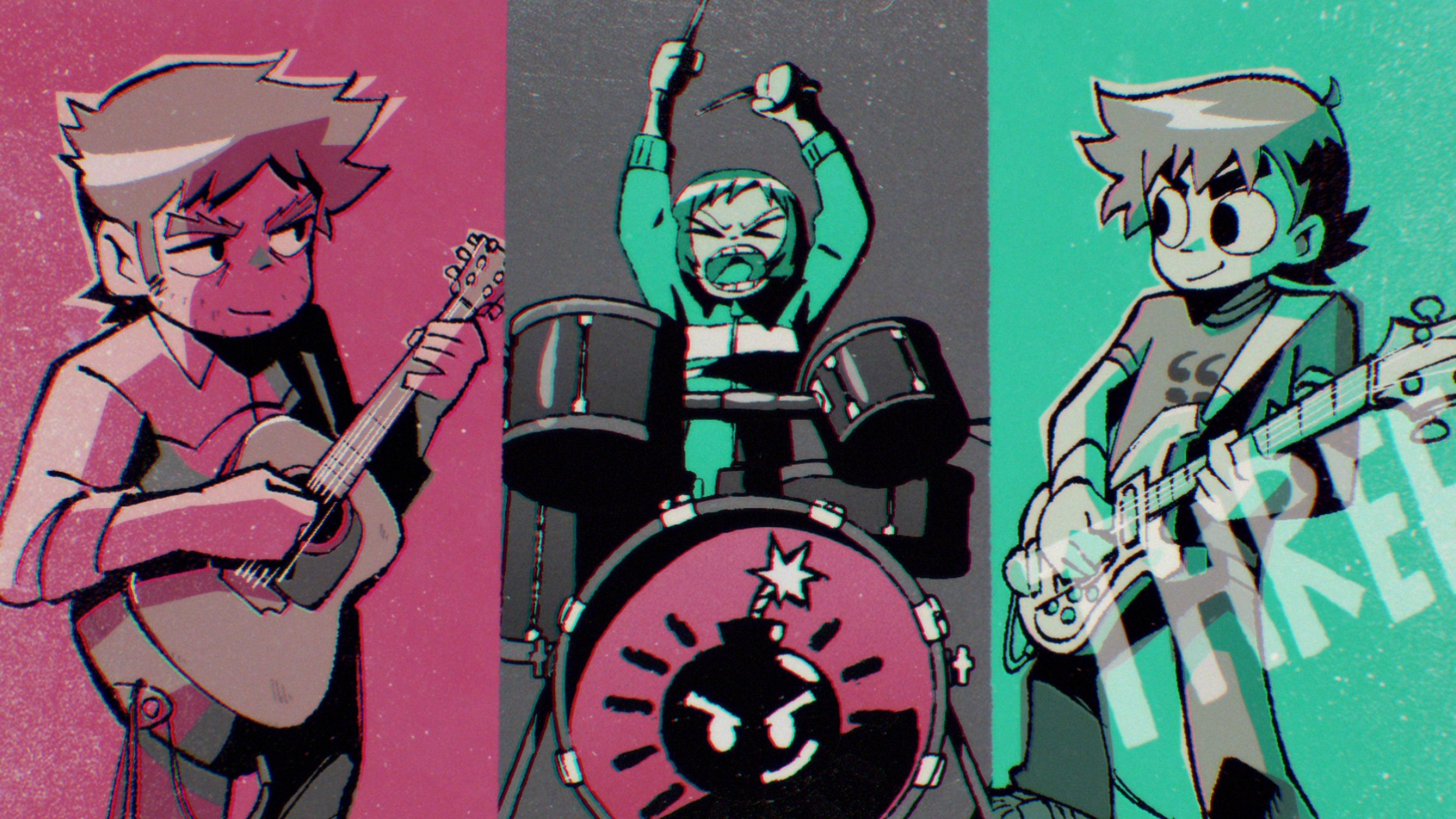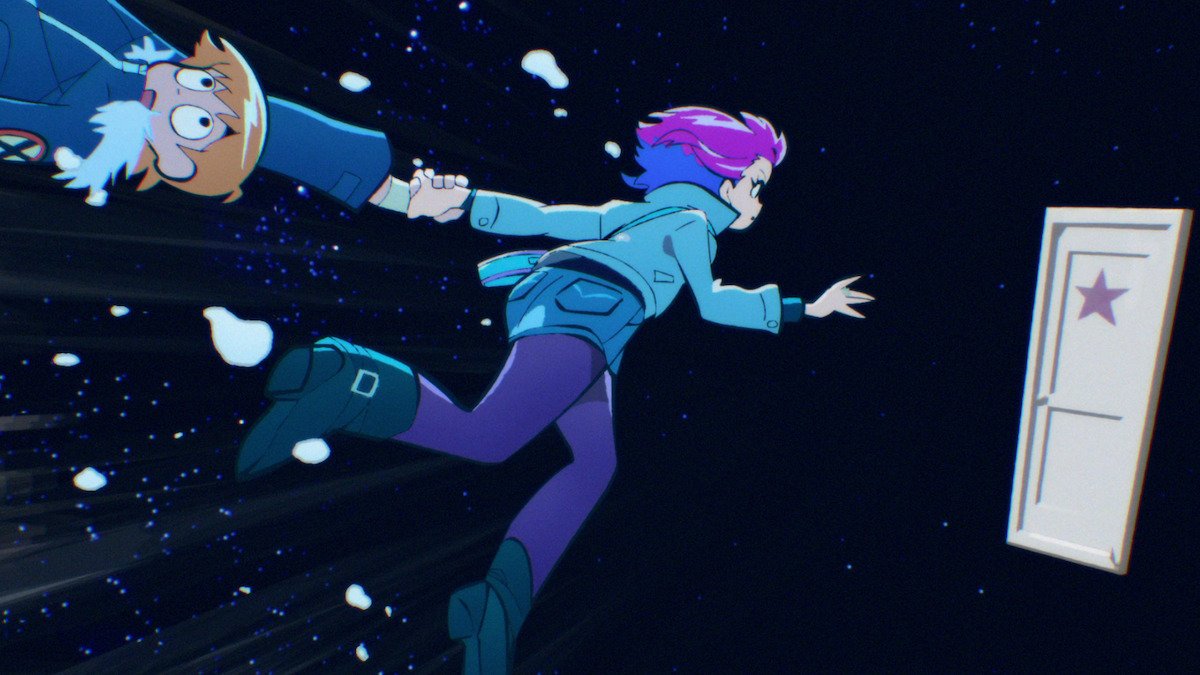Scott Pilgrim Takes Off [Review]
Image: Netflix
Bryan Lee O’Malley’s Scott Pilgrim was published as a series of graphic novels released from 2004 to 2010. In the books, Scott, a driftless young bassist in his early 20s in Toronto, falls in love with Ramona Flowers, literally the girl from his dreams. The problem is that after his first date, he must defeat Ramona’s Seven Evil Exes, who challenge him to battle one at a time, each more powerful than the last. The book is full of video game tropes and references, using them to illustrate the story of Scott navigating life and love.
Edgar Wright directed a film adaptation, Scott Pilgrim Vs the World, released in 2010. Faring poorly at the box office, it found its audience in the years since. It’s an abbreviated take that’s faithful to the source material overall, brought to the screen with an explosive level of energy. It blew my socks off when I saw it on the big screen.
I love both the books and the movie. And now, I love the latest adaptation, Netflix’s animated Scott Pilgrim Takes Off, created, executive produced, and written by O’Malley with BenDavid Grabinski. It’s going to be impossible to review the show without dropping major spoilers.
If you’re a fan, stop reading right now and go watch the show—spoilers ahead.
Image: Netflix
The show, executive produced by Edgar Wright, managed to reunite virtually the entire original cast of the movie adaptation. Here’s a list:
Michael Cera - Scott Pilgrim
Mary Elizabeth Winstead - Ramona Flowers
Kieran Culkin - Wallace Wells
Mark Webber - Stephen Stills
Alison Pill - Kim Pine
Ellen Wong - Knives Chau
Johnny Simmons - Young Neil
Aubrey Plaza - Julie Powers
Brie Larson - Envy Adams
Anna Kendrick - Stacey Pilgrim
Jason Schwartzman - Gideon Graves
Satya Bhabha - Matthew Patel
Chris Evans - Lucas Lee
Brandon Routh - Todd Ingram
Mae Whitman - Roxie Richter
Aside from the returning cast, there are some brilliant additions whose roles I won’t spoil: Kevin Macdonald, Simon Pegg, Nick Frost, Will Forte, and a couple others.
Image: Netflix
The show’s first episode follows story beats that are already familiar to fans. Scott Pilgrim, unemployed bassist of local Toronto band Sex Bob-omb, has recurring dreams of a girl with colorful hair and rollerblades. He meets this girl of his dreams, Ramon Flowers, at a party, and despite already dating the younger Knives Chau, decides to ask Ramona out. After finding out she works delivering DVDs for Netflix, he rents a movie, waits for her to deliver it, and asks her on a date. The date goes well; they agree to see eachother again at Sex Bob-omb’s show the next night. Leading up to the concert, Scott receives and ignores a letter from the League of Evil Exes, about how he must defeat them to date Ramona. The first evil ex, Matthew Patel, shows up to challenge Scott just as Sex Bob-omb is about to play. This is where things take a turn that changes the direction of the whole series: Scott loses. He doesn’t respawn back home after turning into coins—he’s just gone.
From there on out, the protagonist becomes shell-shocked Ramona. She’s convinced Scott may not really be dead and makes it her mission to solve the mystery, embodying a reference to Columbo she makes early in the show. Each episode, she investigates different suspects in the League of Evil Exes and Scott’s friend group.
Image: Netflix
With the investigation, the show creates a dialogue with its original form and previous adaptation, allowing us to question that story from a different perspective. Did Scott even really grow over the course of the original story? Did we ever really understand the Evil Exes in the first place? This shift gives us the chance to spend a lot more time with all of the supporting characters of the original story, giving them a lot more depth than they’ve ever had.
This is especially true about Ramona. Takes Off is about her growth and self discovery rather than Scott’s. The reversal in the first episode, where for the first time someone she gets close to is the one to leave instead of her, sets that journey in motion. She’s forced to really examine and deal with her baggage, previously only really symbolized by the the literally infinite subspace suitcase she carries.
Image: Netflix
Japanese animation studio Science Saru, with director Abel Góngora, have produced a gorgeous looking show. The animation is O’Malley’s art come to life, a real treat. It’s full of life, color, action, and doesn’t just leave the comedy to the dialogue. Science Saru previously brought us the sublime The Night Is Short, Walk On Girl (2017) and many other works by Masaaki Yuasa, along with Akakiri, my favorite Star Wars: Visions short.
The show is scored by Anamanaguchi with Joseph Trapanese. Along with previously having scored the video game adaptation of Scott Pilgrim, Anamanaguchi is an all around awesome video game inspired band who compose with and incorporate the NES into their sound. Aside from the score, there are also other songs in the soundtrack and ending credits of each episode. All of it is great. Spotify has a great official playlist.
Scott Pilgrim Takes Off is one of the most interesting and boldest adaptations I’ve seen. This is Bryan Lee O’Malley having a dialogue with his own work that’s now twenty years old, reexamining it through a different lens, at a different time of his life. The metatextual nature of the show is pushed further by other adaptations of the original story’s events within the show, which is another detail I loved; there’s a Scott Pilgrim movie within the show, and then a second even better stab at an adaptation by the end. The closest I’ve seen to this sort of take is Lana Wachowski’s highly underrated The Matrix: Resurrections (2021), but Scott Pilgrim Takes Off is even more successful, in my opinion. There’s a lot that filmmakers making legacy sequels today could learn from this show.






